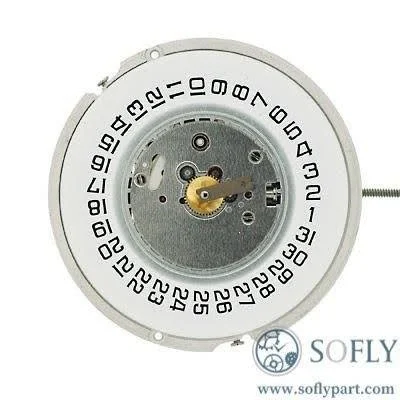Watches have been an essential part of human history, evolving from simple timekeeping devices to intricate pieces of art and technology. Among the various types of watch movements, mechanical and quartz movements stand out for their unique characteristics and mechanisms. This article delves into the details of these two types of movements, highlighting their differences, advantages, and roles in the watchmaking industry.
1. Introduction to Watch Movements
A watch movement, also known as a caliber, is the engine that drives the watch, ensuring it keeps accurate time. Movements are broadly categorized into two types: mechanical and quartz. Each type has its own method of operation, materials, and maintenance needs, catering to different preferences and lifestyles.
2. Mechanical Watch Movements
History and Development
Mechanical watch movement have a rich history dating back to the 16th century. These movements are powered by a mainspring and have been the cornerstone of watchmaking for centuries. The evolution of mechanical watches has seen significant advancements, from the early pocket watches to the sophisticated wristwatches of today.
Components and Functionality
A mechanical watch movement consists of several key components:
- Mainspring: The power source of the watch, which is wound manually or automatically.
- Gear Train: Transfers energy from the mainspring to the escapement.
- Escapement: Regulates the release of energy in precise intervals.
- Balance Wheel: Oscillates back and forth, controlling the timing of the watch.
- Jewels: Synthetic rubies that reduce friction in the movement.
The operation of a mechanical watch is a marvel of engineering. When the mainspring is wound, it stores potential energy, which is then transferred through the gear train. The escapement releases this energy in controlled bursts, allowing the balance wheel to oscillate and regulate timekeeping.
Advantages and Disadvantages
Advantages:
- Craftsmanship: Mechanical watches are often appreciated for their intricate craftsmanship and historical significance.
- Longevity: With proper care, mechanical watches can last for generations.
- Aesthetic Appeal: The visible movement through the case back or skeleton design is highly appealing.
Disadvantages:
- Accuracy: Mechanical watches are generally less accurate than quartz watches.
- Maintenance: They require regular maintenance and servicing.
- Cost: Typically, mechanical watches are more expensive due to the labor-intensive manufacturing process.
3. Quartz Watch Movements
History and Development
Quartz watch movements revolutionized the watch industry in the 20th century. Introduced by Seiko in 1969, the quartz movement utilized a battery and a quartz crystal to keep time, offering unprecedented accuracy and affordability. This innovation led to what is known as the "Quartz Crisis" in the watch industry, where many traditional watchmakers struggled to compete with the new technology.
Components and Functionality
A quartz watch movement includes the following components:
- Battery: Provides the energy needed to power the watch.
- Quartz Crystal: Oscillates at a precise frequency when subjected to an electric current.
- Integrated Circuit: Regulates the movement by counting the oscillations of the quartz crystal.
- Stepper Motor: Converts the electrical signals into mechanical movement to drive the hands.
The operation of a quartz watch is straightforward. The battery sends an electric current to the quartz crystal, causing it to vibrate at a frequency of 32,768 times per second. These vibrations are measured by the integrated circuit, which sends pulses to the stepper motor, moving the watch hands with remarkable precision.
Advantages and Disadvantages
Advantages:
- Accuracy: Quartz watches are extremely accurate, often losing or gaining only a few seconds per month.
- Low Maintenance: They require minimal maintenance, usually only needing a battery change every few years.
- Affordability: Quartz watches are generally more affordable than mechanical watches.
Disadvantages:
- Longevity: The lifespan of a quartz watch can be shorter than that of a mechanical watch due to electronic components that may degrade over time.
- Aesthetic Value: They are often viewed as less prestigious compared to mechanical watches.
- Environmental Impact: The batteries used in quartz watches can have environmental repercussions if not disposed of properly.
4. Comparison of Mechanical and Quartz Movements
When comparing mechanical and quartz watch movements, several factors come into play:
- Precision: Quartz watches are far more accurate than mechanical watches, making them ideal for those who prioritize precise timekeeping.
- Craftsmanship: Mechanical watches are celebrated for their intricate design and craftsmanship, often appealing to collectors and enthusiasts.
- Maintenance: Quartz watches require less maintenance, whereas mechanical watches need regular servicing to ensure optimal performance.
- Cost: Mechanical watches are usually more expensive due to their complex manufacturing process, while quartz watches offer a more budget-friendly option.
- Longevity and Value: Mechanical watches, particularly those from renowned brands, can appreciate in value over time and are often seen as heirloom pieces. Quartz watches, on the other hand, typically do not hold their value as well.
5. Conclusion
The choice between mechanical and quartz watch movements ultimately depends on individual preferences and priorities. Mechanical watches, with their historical significance, intricate craftsmanship, and potential for longevity, appeal to those who appreciate traditional watchmaking artistry. Quartz watches, with their superior accuracy, low maintenance, and affordability, are perfect for those who seek reliable and precise timekeeping.
Both types of movements have their unique strengths and continue to coexist in the watch industry, catering to a diverse range of tastes and needs. Whether you prefer the elegance of a mechanical watch or the practicality of a quartz watch, the world of horology offers a fascinating array of options to explore and enjoy.














